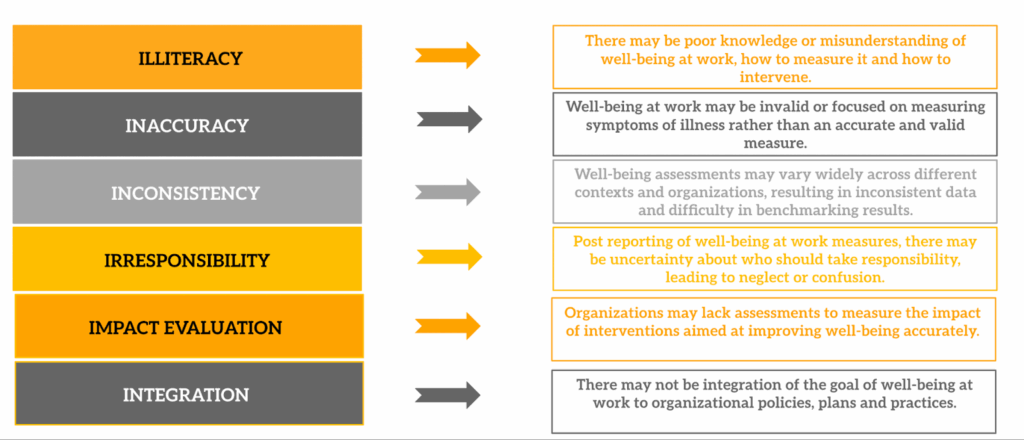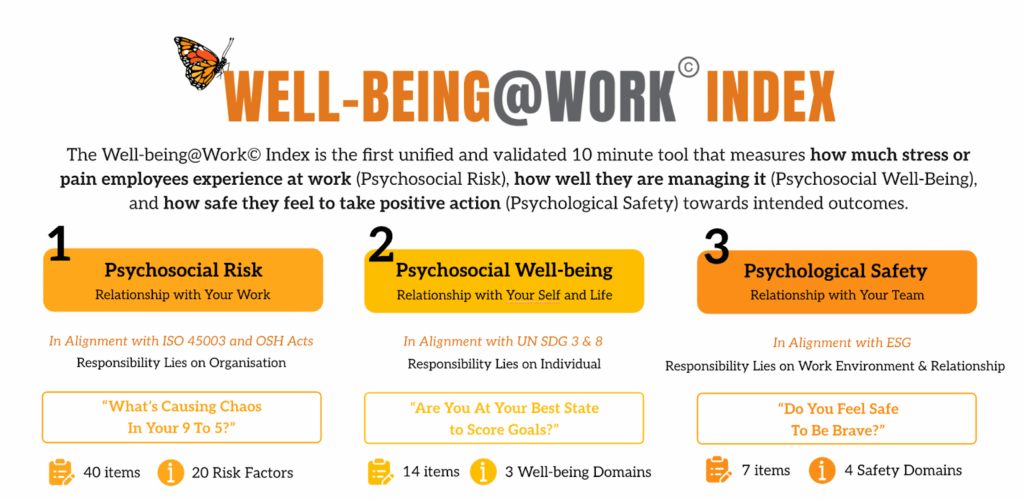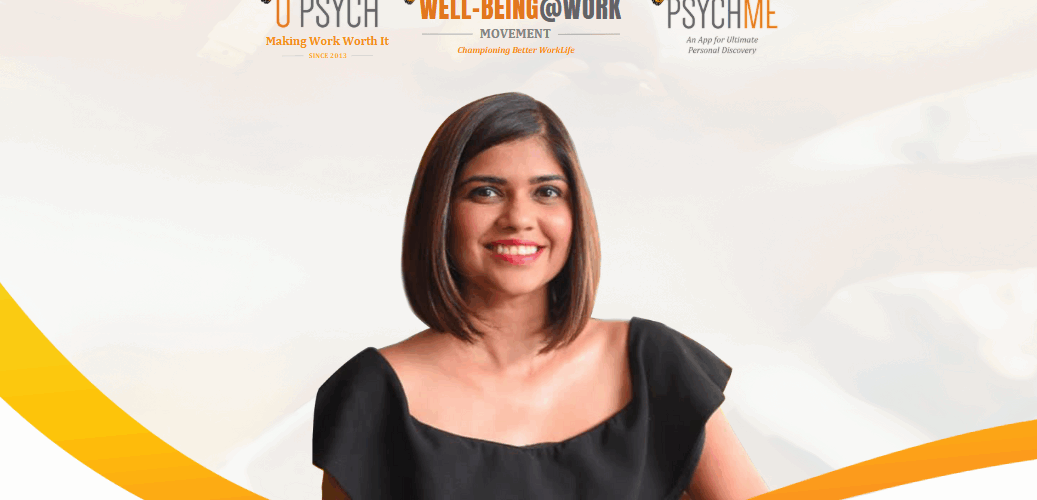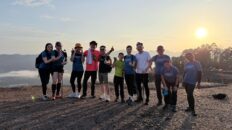Key Takeaways
- Well-being is an individual’s responsibility, not the organisation’s Hetal Doshi makes it clear that while companies and leaders can reduce pain and create safe environments, the accountability for personal well-being lies with each individual. Organizations are not hospitals — they are performance-driven entities.
- Data, not trends, should drive workplace well-being strategies O-Psych’s approach centres on using evidence-based, validated assessments to measure well-being. The Well-Being at Work Index helps organisations move beyond trend-based interventions by offering structured, personalized, and actionable insights.
- The Well-Being at Work Index is built on global science, curated for local relevance O-Psych didn’t create a new assessment from scratch; instead, it structured globally validated assessments (including work by Professor Corey Keyes) into a meaningful framework that tells a story about employee life at work — culminating in a published academic paper in 2025.
- Psychological safety, not just perks, drives high performance The data reveals that teams can thrive even under stress if psychological safety is present. Honest conversations, purpose stories, and personalised praise are core tools to shift teams from victimhood to empowerment.
- Small changes, big impact — the butterfly effect at work.
Hetal uses the butterfly effect to illustrate how seemingly minor choices — like a structured letter, or a 10-minute reflection — can set off powerful transformations in workplace culture. It’s not about massive overhauls, but consistent, meaningful micro-interventions.
Healing is your job
But Hetal had no intention of selling a feel-good narrative. “Organisations are not hospitals,” she emphasised. “They’re designed for performance. Rightfully. And yes, sometimes you’ll get injured — mentally, emotionally — just like in sports. But healing is your responsibility. Not the company’s.”
That distinction formed the heart of O-Psych, the boutique transformation firm Hetal founded in 2013. Its purpose? To ‘Make Work Worth It’ — not just profitable, not just tolerable, but genuinely worthwhile. That meant helping companies understand what they really, really want (nod to the Spice Girls’ punchline), and then aligning their psychological strategies to achieve those business goals.
But crucially, it also meant drawing clear lines of responsibility between the company, its leaders, and its people.
Problem: Don’t ask the right questions, Don’t measure results
“Most companies approach well-being like it’s a trend,” Hetal explained. “They throw in Employee Assistance Programmes, talks during Mental Health Month, maybe some yoga classes. But they don’t ask the right questions before doing all that. They don’t know the problem they’re trying to solve, and they rarely measure what happens after.”
O-Psych’s approach is built on rigour. Their flagship product — the Well-being@Work© Index — is a validated, data-driven, and personalised assessment tool that organisations can deploy across their teams, departments, and even countries.
Accessible via a web-based app, it gives each individual an immediate report on their own well-being, while also aggregating insights for leadership. It’s available in multiple languages, to ensure accessibility.

The Well-being@Work© Index
“Think of it like a national revenue dashboard — but for people,” Hetal said. “Public Listed Companies have numbers for financial performance, and Bursa Malaysia tracks that. But there’s no equivalent for people. The Well-being@Work© Index gives leaders a way to make data-backed decisions not just about profitability, but about people performance.”
The index measures three key things: the risks or psychological pains people face at work, how well they’re coping, and how psychologically safe they feel to speak up. The data isn’t just interesting — it’s surprising. In one case, a plantation company had off-the-charts risk and low psychological safety. But its well-being scores were sky-high.
“They loved their lives,” Hetal said. “They just hated their jobs. It was a close-knit, communal environment — they lived together on the plantation, shared meals, had support systems. So even though the work environment was bad, life still felt good.”
Contrast that with a legal firm where, despite high-pressure workloads and industry-standard stressors, one department recorded unusually high scores in psychological safety. “It tells us that pain is part of the job, but the environment is something you can shape. That department had leaders who’d clearly created a safe, empowering space.”
In both cases, the index didn’t just surface symptoms — it told a story. And for Hetal, stories are essential to any kind of transformation. That’s why the framework for embedding well-being into performance revolved around three plainly simple tools: wisdom, praise, and psychologically safe conversations.
Where real work lies
First are purpose stories — what she calls “collective wisdom from best-case scenarios.” These are real, lived success stories within an organisation, showing how specific teams had managed to thrive despite adversity. “We don’t go in and tell companies what to do. The human condition has always found a way. We help surface those stories.”
Next was praise. Not the vague, fluffy kind, but truthful, grounded recognition. “Imagine you’ve had a terrible day, but someone points out something you’ve genuinely done well. That lands. It matters. It reminds you that there are success stories within you too.”
The third, and hardest, was creating psychologically safe conversations.
“That’s where the real work lies,” Hetal said. “Being able to say, ‘Hey, I noticed something that’s not working. What’s the smallest thing I can do to make this better for both of us?’ That’s what turns a victimhood story into a victory story.”
In one of their experiments, Hetal and her team found that it takes an employee an average of 13 minutes to begin articulating what they really want from their boss — the kind of support that would help them most. “In real scenarios, we don’t have 13 minutes,” she said. “So we ask them to write letters instead. It’s structured, it’s reflective, and it helps them arrive at a meaningful, actionable request much faster.”
The process typically begins with a four-week rollout of the Well-being@Work© Index, followed by team and leadership debriefs, targeted workshops, and re-assessments that close the feedback loop. Some companies opt to pilot with a single department or unit, while others embrace a full organisational rollout from the start. Either way, the data gathered offers a new kind of clarity — a mirror that reveals what’s really happening beneath the surface.
Powering the Index

But this isn’t just another HR tool. At the heart of O-Psych’s work lies a deep commitment to evidence-based data. The app powering the index was shaped by national conversations, and grounded in science. “People had all these questions about well-being,” Hetal said. “But the answers weren’t in opinions or trends. They were in research.”
In developing the index, O-Psych carefully curated and utilised validated assessments rooted in international psychological frameworks, journal-published studies, and global standards — including the ISO45003, UN SDG Goals 3 & 8 and ESG standards.
Findings from the Well-being@Work© Index were published in the Asian Journal of Human Resource Management in the article “The Critical Role of Psychological Risk and Safety in Eliciting Worker Well-Being” by Rebecca Loudon, Hetal Doshi, Kenneth Cafferkey, Keith Townsend, and Adam Robertson.
Hetal illustrated, “Well-being questions that users respond to on the app go beyond surface-level emotion to capture a full picture, for example, how happy someone feels, how often they experience interest in life, how deeply they connect with others.”
The app’s real-time dashboard allows employees to receive their own results immediately while feeding anonymised data into a live, interactive platform that gives organisations visibility across job levels, gender, age, and roles. “It’s the first of its kind from this region,” Hetal said, “and we hope it becomes what the global happiness index is for the West — a unified, Eastern-origin measurement for workplace well-being.”
To support meaningful action, every individual receives a personalised guidebook alongside their report. The guidebook helps employees reflect on their results and explore steps to enhance their own well-being and contribute to others’. Leaders get targeted insights and recommendations for how they can improve work-life dynamics for their teams, while team-level reports enable peer groups to create more psychologically safe environments together. “Everyone acts from their own level of power and control,” Hetal explained. “That’s what creates real ownership. That’s how transformation becomes embedded.”
With that level of insight, transformation doesn’t begin with guesswork — it begins with truth. And for O-Psych, truth is where well-being, performance, and accountability finally meet.
Butterflies
Underpinning it all is Hetal’s favourite metaphor: the butterfly effect. “It’s the idea that very small things, done consciously or unconsciously, can shift the trajectory of a person or a team in enormous ways,” she explained. “Only 5% of butterflies ever reach their full potential. The rest die before becoming what they’re meant to be. And it’s usually just a few small chances — or choices — that make all the difference.”
O-Psych’s interventions, from their workshops to the index itself, are designed to seed those small, strategic changes — not to overwhelm, but to unlock. “Like losing weight,” she said. “You just need to walk 10,000 steps. It’s simple, but it’s hard to do. So we design environments where the hard becomes possible, and eventually, habitual.”
Even with all the tools, Hetal’s message was consistent: you are responsible for your own well-being. “The company’s job is to reduce unnecessary pain. The leader’s job is to create a safe environment. But your job — is to take care of yourself.”
That kind of clarity has been missing in many corporate well-being efforts, Hetal believes, because the narrative has been hijacked by fear.
“The well-being wave turned into a mental illness wave. Companies started thinking they had to become therapists. That’s dangerous. You’re not a hospital. You’re not equipped.”
Hopeful
Still, she’s hopeful. With enough data, enough honesty, and enough personalisation, companies can get this right. Not perfectly. Not always. But in a way that helps them perform without compromising their people.
“Labour, by its very nature, is not bliss,” Hetal said. “But that doesn’t mean we can’t make work worth it. That’s the point. That’s the butterfly effect. Small decisions — a story shared, a praise offered, a conversation made safe — those are the things that change lives. Not slogans. Not trends. Just small truths.”
Well-being@Work© Index – 2025 Report
The Malaysia Well-being@Work© (W@W©) Index is the first unified, validated measure of workplace well-being, assessing Psychosocial Risk, Psychosocial Well-being, and Psychological Safety of employees. Additionally, it incorporates Self-Esteem as a supplementary factor in workplace well-being.
Aligned with ISO 45003, the UN Sustainable Development Goals (SDGs 3 & 8), the International Labour Organization's Workplace Well-being Goals, and ESG Social Goals, it also adheres to Malaysia’s OSH Act (Amendment) 2022.
The W@W© Index is gathered directly from employees within organisations. Employees access their results through the Psych Me App, while organisations and managers utilise the PsychMe Dashboard. Data collected across workplaces feeds into the World Well-being@Work© Dashboard, providing a comprehensive World Well-being@Work© Index Report.
This global-first report offers insights, trends, and actionable recommendations to drive workplace well-being, setting a new standard for nations worldwide. https://2025wawreport.o-psych.com









